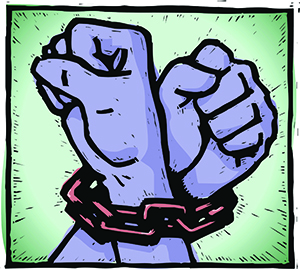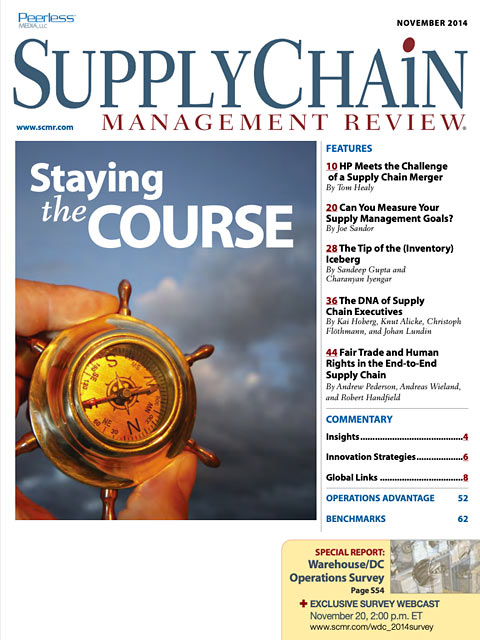Sorry, but your login has failed. Please recheck your login information and resubmit. If your subscription has expired, renew here.
November 2014
Supply chain managers are on the lookout for metrics that will allow them to put a number to their progress - or lack thereof. Welcome to KPI's that allow them to demonstrate the quantifiable value that they deliver. At the same time, Murphy's Law may intervene or they may be called upon to put out fires or come to the rescue and make good on the promises sales and marketing have made to customers - regardless of the cost. So, how do you measure success? I hope this month's issue and online bonus feature help you consider how you measure your progress. Browse this issue archive.Need Help? Contact customer service 847-559-7581 More options
In 2013, a debate took place on the trade publication Confectionarynews.com about new labeling rules proposed by Fair Trade USA, an organization that certifies commodities like cocoa and coffee, often produced in impoverished economies with irregular labor practices. Although the organization has its share of passionate supporters, several detractors emerged in this debate, including one NGO that labeled the proposed changes “a hoax” and a premium chocolate maker who contended that the changes would damage “the integrity of the Fairtrade system.” Six months later, NGOs gave lukewarm approval to a new round of proposed changes, while adding that the organization’s policies don’t go “far enough to combat exploitative sugar sourcing.”
The debate underscored just how difficult it is for supply chain managers to do what they perceive is the right thing. Without question, consumers want to purchase products that are created without exploiting the farmers and workers who have a hand in their production. As an example, 85 percent of the respondents to research by Lake Research Partners found that the Fair Trade Ingredients label “would help them make better choices,” according to Confectionarynews.com. Responding to consumer demand, more large CPG manufacturers are implementing certification programs across a variety of products—and using multiple labels and certifications. In fact, while many consumers and supply chain managers conflate the term “fair” with product certification generally, there are over 200 different ethical and sustainable certifications available in today’s marketplace.
Their appeal is simple. Domestic and global organizations like Fairtrade argue that by enforcing higher prices to cooperatives, money will trickle down to farmers and their communities to alleviate poverty and improve their lives. Here’s the problem, in my view: While not illogical, Fair Trade’s approach has yet to be empirically validated. In fact, recent research has cast serious doubt on Fair Trade’s ability to deliver on that central message and alleviate rural poverty in low-income countries.
 |
This complete article is available to subscribers
only. Click on Log In Now at the top of this article for full access. Or, Start your PLUS+ subscription for instant access. |
SC
MR
Sorry, but your login has failed. Please recheck your login information and resubmit. If your subscription has expired, renew here.
November 2014
Supply chain managers are on the lookout for metrics that will allow them to put a number to their progress - or lack thereof. Welcome to KPI's that allow them to demonstrate the quantifiable value that they… Browse this issue archive. Access your online digital edition. Download a PDF file of the November 2014 issue.
 |
Download Article PDF |
In 2013, a debate took place on the trade publication Confectionarynews.com about new labeling rules proposed by Fair Trade USA, an organization that certifies commodities like cocoa and coffee, often produced in impoverished economies with irregular labor practices. Although the organization has its share of passionate supporters, several detractors emerged in this debate, including one NGO that labeled the proposed changes “a hoax” and a premium chocolate maker who contended that the changes would damage “the integrity of the Fairtrade system.” Six months later, NGOs gave lukewarm approval to a new round of proposed changes, while adding that the organization’s policies don’t go “far enough to combat exploitative sugar sourcing.”
The debate underscored just how difficult it is for supply chain managers to do what they perceive is the right thing. Without question, consumers want to purchase products that are created without exploiting the farmers and workers who have a hand in their production. As an example, 85 percent of the respondents to research by Lake Research Partners found that the Fair Trade Ingredients label “would help them make better choices,” according to Confectionarynews.com. Responding to consumer demand, more large CPG manufacturers are implementing certification programs across a variety of products—and using multiple labels and certifications. In fact, while many consumers and supply chain managers conflate the term “fair” with product certification generally, there are over 200 different ethical and sustainable certifications available in today’s marketplace.
Their appeal is simple. Domestic and global organizations like Fairtrade argue that by enforcing higher prices to cooperatives, money will trickle down to farmers and their communities to alleviate poverty and improve their lives. Here’s the problem, in my view: While not illogical, Fair Trade’s approach has yet to be empirically validated. In fact, recent research has cast serious doubt on Fair Trade’s ability to deliver on that central message and alleviate rural poverty in low-income countries.
 |
SUBSCRIBERS: Click here to download PDF of the full article. |
SC
MR


Latest Supply Chain News
- How S&OP provides the answer to in-demand products
- AI, virtual reality is bringing experiential learning into the modern age
- Humanoid robots’ place in an intralogistics smart robot strategy
- Tips for CIOs to overcome technology talent acquisition troubles
- There is still work to do to achieve supply chain stability
- More News
Latest Podcast

 Explore
Explore
Latest Supply Chain News
- How S&OP provides the answer to in-demand products
- AI, virtual reality is bringing experiential learning into the modern age
- Humanoid robots’ place in an intralogistics smart robot strategy
- Tips for CIOs to overcome technology talent acquisition troubles
- There is still work to do to achieve supply chain stability
- Blooming success: The vital role of S&OE in nurturing global supply chains
- More latest news
Latest Resources

Subscribe

Supply Chain Management Review delivers the best industry content.

Editors’ Picks





